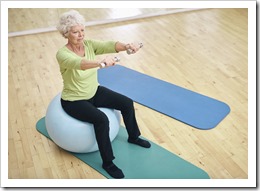Prevention of falling is one of the main ways of preventing fractures related to osteoporosis. And, it makes sense that exercise programs that support muscle strength and balance, would lower the risk for a fall in elderly individuals. Improving eyesight helps too. There have been randomized trials that have shown that an exercise program that emphasizes balance does indeed lower the risk for falls in elderly housing, but these studies have not had some of the statistical strength that is often desired as a gold standard. In this current study, done at multiple centers in France, 706 women ages 75-85 who had decreased balance or compromised gait and were still living in their own homes, were randomly assigned to a 2 year balance training program or no such program. The balance training program consisted of a weekly supervised group session which was then augmented with an individual home exercise program.
 In the balance training program group, there were significantly fewer injurious falls than in the control group. In those women who had a serious fall (fracture or head injury and hospitalization, joint dislocation or laceration and surgical repair), 68 occurred in the treatment group and 87 in the non-treatment group. After 2 years, women in the balance training program had significantly better balance and gait testing than women in the no treatment group.
In the balance training program group, there were significantly fewer injurious falls than in the control group. In those women who had a serious fall (fracture or head injury and hospitalization, joint dislocation or laceration and surgical repair), 68 occurred in the treatment group and 87 in the non-treatment group. After 2 years, women in the balance training program had significantly better balance and gait testing than women in the no treatment group.
Commentary: Having a fall that causes a fracture and especially a hip fracture, is one of those life-changing events for a high percentage of elderly women. Not only is there a risk of dying due to the fall and associated complications, there is often a health decline and premature need to be in a nursing home situation. This study confirms and encourages us as to the importance of balance training programs to reduce the incidence of falls in elderly women who are at risk for falls.
Reference: El-Khoury F, et al. Effectiveness of two year balance training program on prevention of fall induced injuries in at risk women aged 75-85 living in community: Ossebo randomized controlled trial. BMJ 2015;July 22; h3830.

